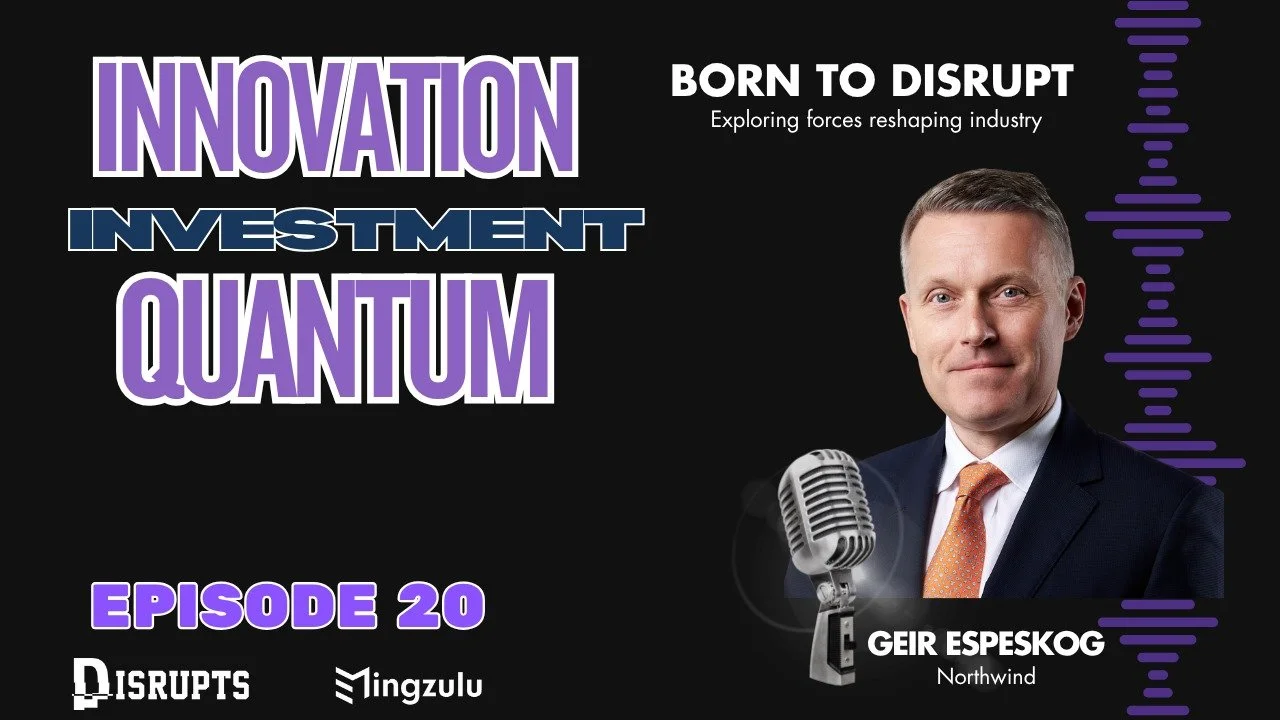Born to Disrupt – Geir Espeskog on ETFs, Thematic Investing and the Quantum Revolution
In this episode of Born to Disrupt, hosts Grant Niven and Mark Walker are joined by Geir Espeskog, founder of Northwind and former BlackRock executive, for an in-depth discussion on the evolution of exchange-traded funds (ETFs), thematic investing, and how breakthroughs in quantum computing and artificial intelligence are shaping the next industrial revolution.
Geir begins by recounting his journey from an engineering background into the world of finance. After a decade trading derivatives at Goldman Sachs, he joined BlackRock during the global financial crisis to help grow its ETF business in the Nordics. He later led ETF distribution across Asia Pacific and built sustainability teams in Singapore before founding Northwind in Abu Dhabi in 2023. His new venture focuses on product design strategy, distribution strategy, and content marketing with a global outlook.
Explaining ETFs in simple terms, Geir describes them as funds that trade like stocks, combining the diversification and transparency of index funds with the liquidity and convenience of equities. This low-cost innovation, now a $17 trillion industry, has transformed how investors build portfolios. While ETFs are widely adopted in the US through advisory models, Europe and the Middle East have traditionally relied on bank-distributed funds. However, technology and mobile trading platforms are rapidly changing that landscape, with a new generation of self-directed investors embracing ETFs and savings plans.
The conversation moves into thematic investing, an approach that focuses on long-term megatrends rather than short-term market cycles. Geir explains that Northwind identifies sustainable themes—not fleeting fads—through deep research, blending active insight with index transparency. He outlines how recent years have rewarded concentrated bets on companies like Nvidia and Bitcoin, but stresses the importance of core-satellite portfolio design, where a stable core is complemented by high-potential themes.
From there, the hosts explore the fourth industrial revolution, where technology, energy, and security are becoming deeply interconnected. Geir introduces his framework called T-E-S-T—Technology, Energy, and Security Triangle—arguing that modern innovation is driven by exponential R&D spending across these domains. He traces how conflict and geopolitical competition have historically spurred scientific breakthroughs, from the transistor to the internet, and how today’s tech giants like Nvidia, Microsoft, Google, and Meta are outspending governments in R&D. This surge, he believes, is fuelling the next wave of disruption, powered by AI and quantum computing.
The discussion then delves into quantum computing, a topic Geir explains with remarkable clarity. Unlike traditional binary computing, quantum systems leverage “qubits,” which can exist in multiple states simultaneously, enabling exponential processing power. While still in its early stages, quantum computing could soon outperform classical computers in complex problem-solving—potentially by 2027 to 2029, according to research from MIT and Stanford.
Applications range from drug discovery and materials science to financial modelling, logistics optimisation, and climate simulation. Quantum could also revolutionise encryption and communication, making ultra-secure networks possible while posing new cybersecurity challenges. Geir highlights the convergence of AI and quantum as particularly transformative, enabling faster drug development and real-time simulation of molecular behaviour. As he notes, “It’s power in, intelligence out.”
The episode closes with reflections on how innovation cycles are repeating—governments once owned the first computers, and now large corporations are leading the next leap. Geir predicts that within a few years, data centres will house CPUs, GPUs, and QPUs (quantum processing units) side by side, accessible to all through cloud computing.
Looking ahead, Northwind is developing new “all-weather” thematic strategies, expanding beyond purely tech-driven themes to uncover durable global investment trends. Based between Abu Dhabi and Asia, Geir sees the Middle East emerging as a powerful innovation hub bridging East and West.

